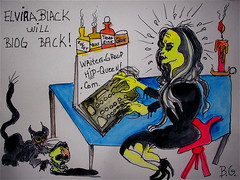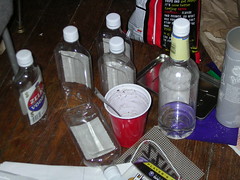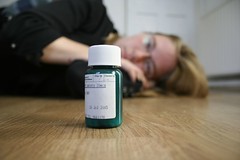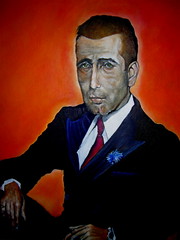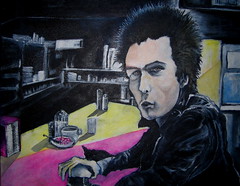AUTISTIC, ATTENTION DEFICIT, OR JUST PLAIN WEIRD?
There's no getting around it--I was a weird kid--but I did have my good points. Thanks to my dad, I started to read before they taught me in school, which at least gave me the moniker of "best reader in the class"--and was probably one of the reasons I eventually became a writer.
But aside from that, my name was mud in grade school. I was always "daydreaming." Although I was in the "smart" class, and always did well academically, I remember blanking out whenever the teacher would give directions for a project or exercise. Then I would try to ask a classmate what it was all about, and they would sometimes help me, but I do remember a lot of "ooh, you're gonna get in big trouble" remarks. Thanks, kid.
When I was stressed--in situations like that--I remember that I used to get this burning sensation that seemed to extend from my face into my brain. Panic, anxiety, whatever it was, it sucked.
Now that they have a label for everything--the DSM has fancy sounding names for many "disorders" that just used to be called "being an asshole"--I've tried to imagine in retrospect what my problem was.
When looking on Wikipedia for info on Syd Barret for an
older post, I followed a link to
Asperger's syndrome, which is a form of autism, or autism spectrum disorder, to be exact. Of course, since it had a cachet of glamor surrounding it, I decided that this was what I had back then. See their cool link to a
list of prominent people--including Steven Spielberg, Andy Warhol, Dan Ackroyd, Michelangelo, and Isaac Newton-- who were either diagnosed with, or have symptoms consistent with, autistic spectrum disorder. This made me feel cool and hip. (And
Henry, here's a special
link for you--featuring a debate over whether Albert Einstein and Bill Gates were/are autistic. Enjoy!)
Although they are often intelligent and proficient in many ways, Asperger's sufferers often have significant problems functioning socially, and are often the target of bullies. The theory is that there is some kind of deficit involving processing social information correctly and deciphering such things as tone of voice and body language. A super-simple question can confuse and frustrate an Asperger's sufferer. And sure enough, I recall instances where this seemed to happen to me. Here are two that stand out:
On the first day of school--I guess kindergarten or first grade--the teacher took attendance. She slightly mispronounced my first name, which set off a paralyzing dilemma in my mind. One part of me said--she must be referring to me. Another part of my brain said--maybe there's another person with the same name but a different pronunciation. She had to call my name three times before I finally said "here."
Another time a neighborhood mom offered me cookies or something. For some reason, I couldn't answer "yes" or "no thank you." . After an long, awkward pause, she finally turned away with a disgusted/exasperated look on her face. What was going through my mind--I don't know. The question somehow just seemed too complex for me.
Here's a quote from Wikipedia, giving an example I can relate to:
"When a teacher asks a child with Asperger's, "Did the dog eat your homework?", the child with Asperger's will remain silent if they don't understand the expression, trying to figure out if they need to explain to the teacher that they don't have a dog and also that dogs don't generally like paper. The child doesn't understand what the teacher is asking, cannot deduce the teacher's meaning, or the fact that there is a non-literal meaning, from the tone of voice, posture or facial expression, and is faced with a question which makes as much sense to him as "Did the glacier in the library bounce today?". The teacher may walk away from the experience frustrated and thinking the child is arrogant, spiteful, and insubordinate. The child sits there mutely, feeling frustrated and wronged."
I can dig it.
Although I had a friend or two outside of school, and I loved to visit my cousins, I was an only child, and since my mom also suffered from depression, and my dad sometimes worked weird shifts, I wound up spending a lot of time alone--to read, listen to music, ride my bike, examine cool bugs, watch horror movies on Saturday night, and mull life over. I was essentially a loner until I reached junior high. Then, somehow, I turned "normal." But I do think that kids who spend a lot of time with their own thoughts and left to their own devices may have an advantage later in life. They may not be "normal," in the sense of being very straight and super popular and always knowing how to make small talk and feeling comfy talking to new people. But the misfits who don't learn how to conform and follow the flock are, I think, sometimes quite interesting individualists later in life. At least, I like to think so, for obvious reasons.
Anyway, the point of all this talk about ME is that firstly, if I were in grade school today with the same "symptoms," I am fairly certain they'd be pumping me full of Ritalin right now. And secondly, without the help of meds, I somehow (apparently) managed to get over it. Attention deficit disorder, indeed.
THE RITALIN RIDDLE
I have an excellent shrink. He is a dying breed--although he prescribes my meds, he takes the time to really talk with me in the half-hour I see him. He asks me how I'm feeling, we review the meds I'm on and consider whether they need to be adjusted, and then I"m free to let him know what's going on with me in more detail. He can rattle off drug effects and side effects and always knows the latest scoop, pharmaceutically speaking.
But during my last appointment, when I mentioned I'd been feeling particularly sluggish, he asked me what I thought about taking a small dose of
Ritalin or dexedrine.
Frankly, I was kind of surprised. I told him that since ups had been my drug of choice as a reckless youth, I didn't think it was a good idea. He admitted that although it helped some of his patients, others started to take more than was prescribed and had to be tapered off. I just didn't want to go there.
I'm not a doctor, of course, but I always thought that Ritalin was basically used for
Attention Deficit Disorder, primarily in kids. It is basically a stimulant--similar to amphetamine, but perhaps milder. My feeling--partly based on first-hand experience-- was that stimulants might make you feel good initially, but when you came down, you'd likely crash and feel shittier than before--or simply start to take more and more to get that good old feeling again. Ritalin, amphetamines, and other stimulants are Schedule II drugs, which are considered to have therapeutic applications but can nevertheless be abused. In fact, some schoolkids sell each other some of their stash, and some crush up the tabs and snort them for greater recreational effect. According to my Bible in all things au courant--New York Magazine--the latest trend among the hip rich New York kids is to sell and abuse assorted prescription meds, which sometimes involves raiding mom and dad's medicine cabinets-- and swapping different pharmaceuticals for a nice clean American buzz.
I did a search on Ritalin side effects, and found a website by
Peter R. Breggin, a psychiatrist trying to put the word out that many psych meds are potentially quite dangerous and overprescribed. He felt that the combination of overcrowded classrooms and perhaps inattentive parents who didn't want to put up with a little natural rambunctiousness were turning kids into drugged, but well behaved, robots. And I quote:
"Dr. Breggin has been informing the professions, media and the public about the potential dangers of drugs, electroshock, psychosurgery, involuntary treatment, and the biological theories of psychiatry for over three decades... For thirty years Dr. Breggin has served as a medical expert in many civil and criminal suits including individual malpractice cases and product liability suits against the manufacturers of psychiatric drugs. His work provided the scientific basis for the original combined Prozac suits, for the more recent Ritalin class action suits, and for label changes in many psychiatric drugs."
His full credentials, which are very impressive, are included on the website. For a nice good scare, take a look at some of the many articles included here. (There is also a very illuminating and alarming, albeit old, article from Policy Review entitled
Why Ritalin Rules.
The thing is, that many of the players in the drug/antidrug game have motives that are far from pure. Everyone is making a killing--the drug companies, the insurance companies, the shrinks, the school counselors. And the pushers of natural alternative supplements play on the fears of the public about the side effects of pharmaceuticals. But of course, the fact that a substance is "natural" is no guarantee it is safe. (Can you say Ephedra?) The Scientologists have an excellent motive for opposing drugs--they have the non-medical answer for anyone who joins their cult. And of course, there are the lawyers--always the lawyers--ready to step in as soon as a drug is pulled from the market, or sometimes before. And although Dr. Breggin's efforts certainly seem laudable, I'm sure he gets paid a pretty penny to testify in all those class-action suits.
On the other hand, I've read of a drug that has been used in Europe for years and has just been approved, finally, by the FDA. It is used in the treatment of alcoholism. Mind you, it's not a magic pill--I think it works best on those who have been sober for a year and wish to remain so--but have you ever heard of it? Didn't think so. Where are the ads for this drug on tv? Haven't seen a one. Wonder why? Hmmm--could it have anything to do with the fact that the AA/rehab industry is so profitable and ubiquitous? (Not to mention that the US drug manufacturers don't hold the patent on the med, thus making it much less profitable?) Imagine telling an AA'er that there might be a pill that could help them stay sober. Blasphemy!
JUST SAY NO?
What I find particularly ironic are those "parents--the anti-drug" ads. The best one shows a dad pacing the floor, wracked with guilt and shame. The voiceover is something to the effect of: just because you toked your brains out when you were younger is no reason not to prevent your kids from having some fun. That's one of the many reasons I never had children--how do you tell your kids not to have sex or party when you'd been there yourself?
But meanwhile, while medical marijuana is still not accepted in most states, parents, shrinks, and schools are pumping millions of kids full of Ritalin to make them more manageable. The pharmaceutical companies have taken their case directly to the consumer (ask your doctor about...)--and there is, indeed, a pill for everything. Of course, the commercials will tell you upfront about common and rare side effects--some of which may include death--but that's all cool.
THE ANSWER IS THAT THERE IS NO ANSWER
I'm no Tom Cruise. I do think that drugs save countless lives and help restore many people to sanity. My boyfriend BG might not be alive if it weren't for the HIV meds he takes twice a day. But drugs are crude, and hormones and brain chemicals are infinitely complex and interconnected. Thus, bizarro side effects are possible with almost any drug. I even read of a case where someone died by taking one too many 12-hour cold tabs. As for me, after taking Lithium for many years, I now have to take Synthroid--a synthetic thyroid med--for the rest of my life.
As a crazy person, I've heard people say "take your meds." (I do, I do). I've heard other people say you don't need those silly meds (I do, I do). I'm just very, very thankful they didn't have all the kiddie pills around when I was a youngster. I've already been through electroshock, and I'm taking enough pills for several lifetimes right now.
TALK AMONGST YOURSELVES--THEN TALK TO ME!
What do YOU think? Drugged up minds want to know!

